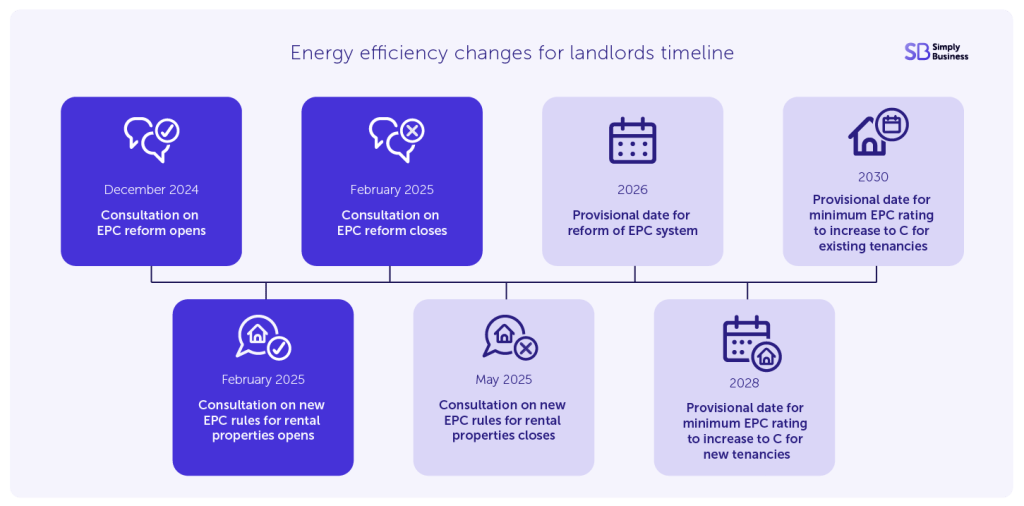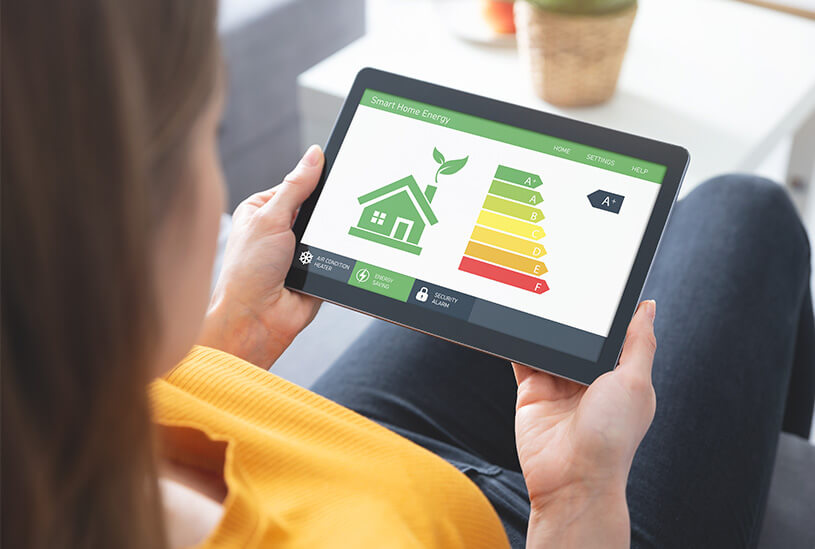Landlords will need to make sure rental properties have a minimum Energy Performance Certificate (EPC) rating of C by 2030.
The proposed new requirement is part of the government’s Warm Homes Plan, originally outlined in its election manifesto.
And from 2026, the government is planning to update the way energy performance in properties is measured and scored.
What do you need to know about plans for new energy efficiency rules, how could they affect the buy-to-let market, and how can you respond to the government consultation?
- What are the proposed changes to EPC rules?
- Plans for an updated EPC system from 2026
- Will rental properties meet the new EPC deadline?
- Landlords reveal cost of increasing EPC rating
- Could increased EPC ratings lead to higher tenant demand?
- Proposed EPC changes – what happens next?
- Energy performance ratings in the rest of the UK
Changes to energy efficiency rules – what is the government proposing?
The government is proposing to increase the minimum EPC requirement for rental properties from E to C. This would apply to new tenancies from 2028 and all existing tenancies from 2030.
It’s important to note that the government is also planning to overhaul the EPC system in 2026, introducing new metrics.
These will be based on how properties retain heat rather than how much energy a property uses. A consultation on reforming the EPC system in 2026 closed in February 2025.
Properties that have an EPC C rating before 2026 will be compliant until the EPC expires (they usually last for 10 years).
Properties that don’t have an EPC C rating by the time the new system is introduced in 2026 will need to get a new EPC to meet the 2028 and 2030 deadlines.
Read more: What is an EPC rating? MEES guide for landlords
New EPC rules consultation – deadline approaching
The government is currently consulting on the plans to increase the minimum EPC rating for rental properties.
Amongst other things, it wants to know:
- whether the proposed spending cap of £15,000 should be lowered to £10,000 for some properties
- whether EPC rules for rental properties should be extended to short-term lets
- how regulation could be used to drive the installation of smart meters
- if new exemptions for EPC rules should be introduced
Landlords are invited to respond online. The consultation closes on 2 May 2025.
Updated EPC system from 2026 – what landlords need to know
The current EPC system is based on estimated running costs and how much energy a property uses.
It’s been suggested that this penalises properties that are heated using electricity (such as a heat pump) as electricity is more expensive than gas.
The new proposed system will measure properties on:
- heating systems – how efficient the heating system is, with a priority for efficient systems like heat pumps
- fabric performance – how well the property retains heat through insulation, draught-proofing, and windows
- smart meter readiness – whether the property can measure energy use using a smart meter
The new system is designed to provide more accurate long-term performance data for properties. It’s not yet clear whether the A-G rating system will be retained or replaced.
Read more: 600,000 homeowners urged to upgrade electricity meters by June 2025
Will all rental properties meet the 2030 EPC deadline?
At the current rate that landlords are making energy efficiency improvements, it would take until 2042 for all rental homes to meet the new standards, according to research by Hamptons.
To meet the 2030 target, it’s estimated that each year around 340,000 rental homes will need to make improvements to achieve a minimum EPC rating of C.
Estate agency Hamptons’ analysis of Ministry of Housing, Communities and Local Government data shows that between January and August 2024, 39 per cent of rental homes with new EPCs moved into a higher band.
More than one in 10 (13 per cent) dropped into a lower band, while 48 per cent saw no change.
Over half (55 per cent) of rental properties with a new EPC during this period had a rating of C or higher.
It’s estimated that up to four per cent of rental properties won’t achieve a minimum EPC rating of C.

Significant cost of increasing EPC rating for many landlords
A Simply Business study of almost 2,000 landlords in 2024 found that 33 per cent considered making their property more energy efficient their biggest challenge.
Half (50%) of landlords said they’ll need to make improvements to their property to meet a minimum EPC standard of C by 2030.
More than one in 10 (11 per cent) anticipated energy efficiency improvements could cost them over £10,000. Meanwhile, over a third (34 per cent) expect them to cost between £1,000 and £10,000.
There’s likely to be a spending cap (a maximum amount owners would need to spend on improvements), which could be less than £10,000. As a result, many landlords may spend the maximum on improvements without reaching the desired minimum EPC rating.
Higher EPCs could lead to increased tenant demand
Rental homes that are more energy efficient could reduce utility bills for tenants.
Hamptons’ research shows that a tenant living in an average property with an EPC C rating would pay £499 less a year in utility bills, compared to a tenant living in an average property with an EPC D rating.
The difference is even bigger between typical properties with EPC C and EPC E ratings, with an estimated annual saving of £1,248.
| EPC rating | Average size (sq m) | Average annual running cost 2024 |
| A | 78 | £1,046 |
| B | 66 | £711 |
| C | 68 | £983 |
| D | 75 | £1,482 |
| E | 80 | £2,231 |
| F | 87 | £3,242 |
| G | 90 | £5,462 |
With the rising cost of living remaining a concern for many tenants, demand for properties with higher EPC ratings could increase.
This means that while energy efficiency improvements may be costly for landlords, in the long term the cost could be offset by higher average rents and shorter void periods.
Changes to energy efficiency rules – what happens next?
The consultation on increasing the minimum EPC rating for rental properties closes on 2 May 2025. The government will analyse responses before drafting new regulations and plotting a timeline for implementation.
Before then, findings from the consultation to reform EPCs could be published. At this point, the government could confirm the 2026 implementation date, and how EPCs will be scored moving forward.
What about energy performance ratings in the rest of the UK?
The UK government sets EPC ratings in England and Wales, so the changes mentioned relate to properties in these countries.
However, the Scottish government ran a separate consultation on the same issue in 2021. There are also a different set of energy efficiency regulations in Northern Ireland.
More guides for buy-to-let landlords
- What is buy-to-let investment? A guide to buying and selling property
- Landlord responsibilities – a guide to property maintenance and repair
- A landlord’s guide to to renting with pets
- Rental property noise complaints: a guide for landlords
